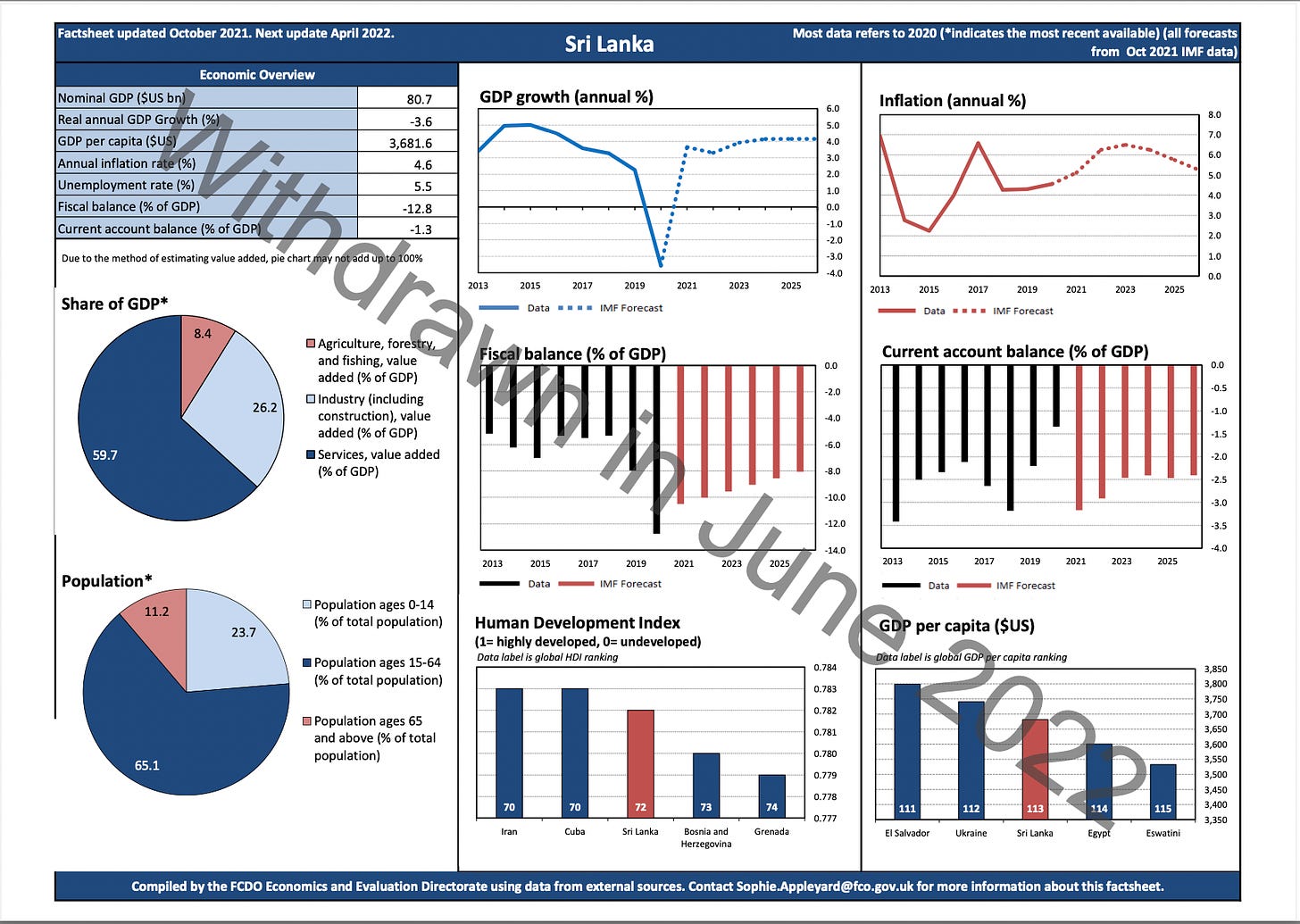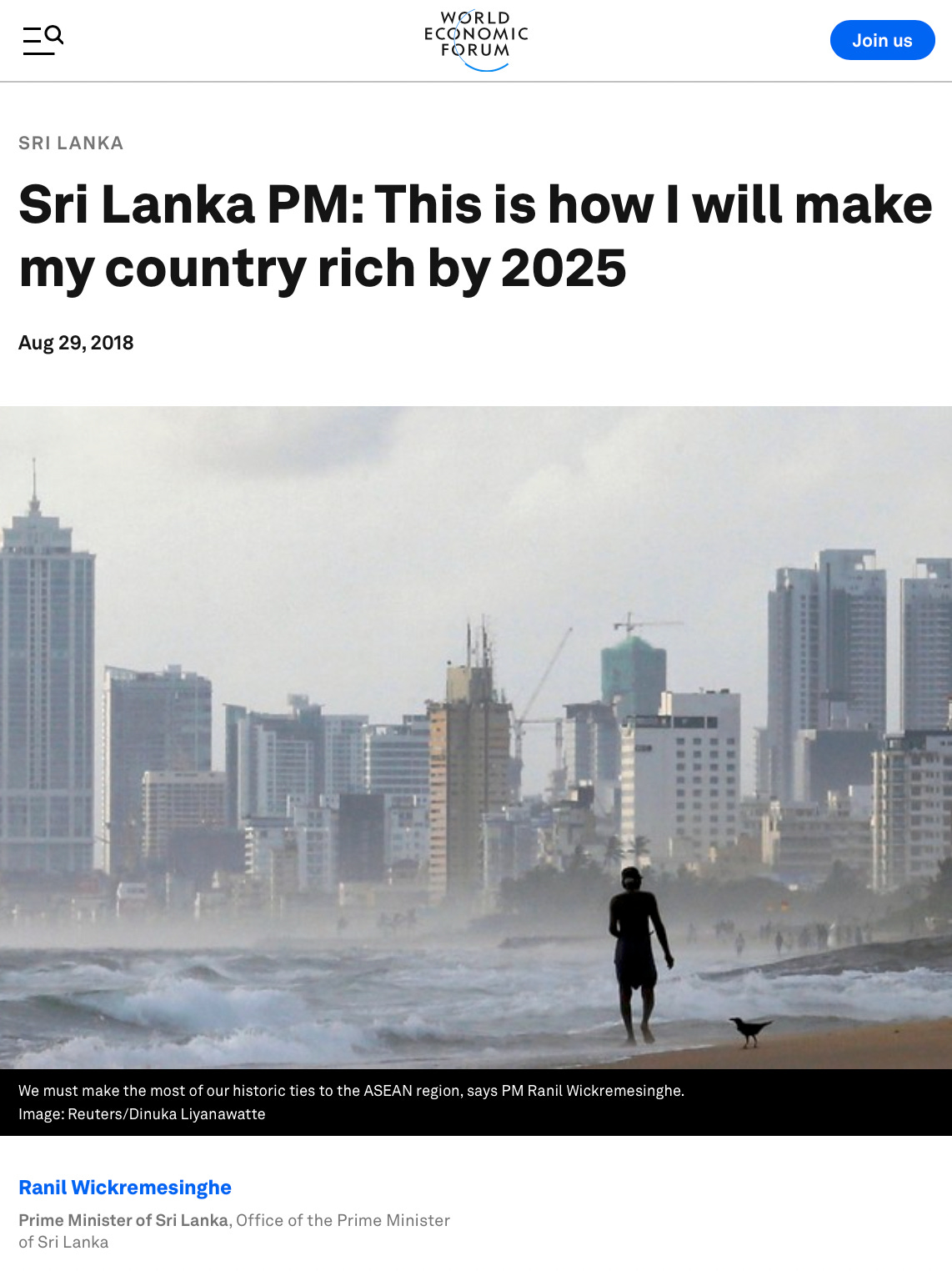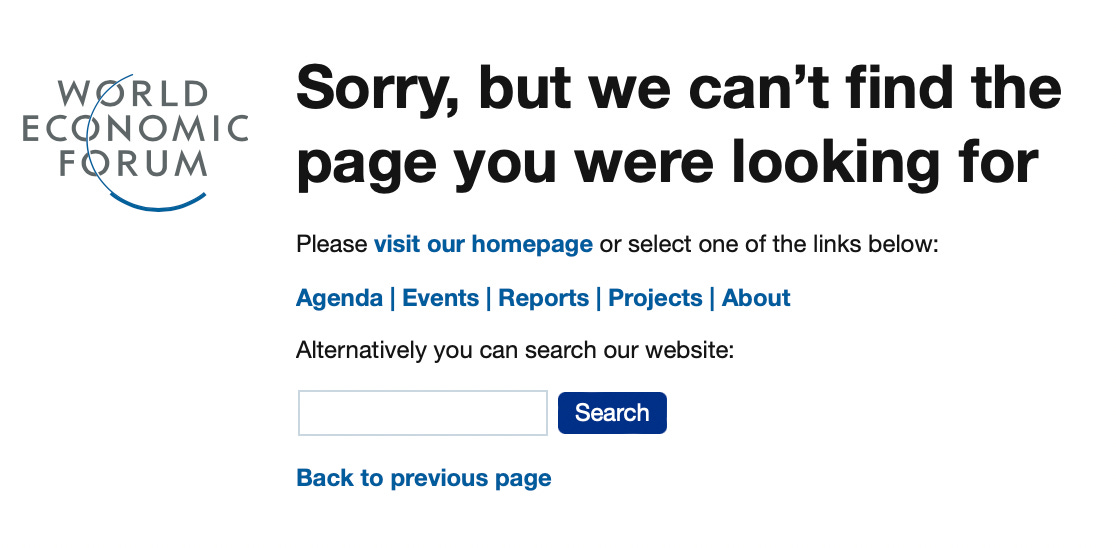Sri Lanka, the WEF and the Curious Case of the Disappearing Article
“Yesterday, upon the web,
I clicked a link but found it dead.
It wasn’t there again today.
I wonder why it went away...” [1]
“History will be kind to me, for I intend to write it.” - Churchill
Sri Lanka is facing catastrophe. In June, the Sri Lankan Prime Minister was quoted as saying, “Our economy has completely collapsed” [2]. “We're fighting for our lives and freedom,” wrote one citizen [3]. At the time of writing (13 July 2022) the tragedy continues to unfold, with the BBC today reporting that the President “has fled Sri Lanka on a military jet, amid mass protests over the island's economic crisis.” [4] The UK Foreign, Commonwealth & Development Office’s “Sri Lanka economic factsheet” [5], which shows IMF forecasts of a sharp GDP recovery and growth from 2021 onward, has been withdrawn.
Much will, no doubt, be said about why the collapse occurred. Themes appear to include: hubris and arrogance of leaders and their advisers; excessive central planning and control; lockdowns (and loss of tourism); the imposition of agendas, e.g. a ban on the use of chemical fertilisers in an effort to become the world's first organic country, which helped trigger a food shortage [6,7]. These are all worryingly familiar to anyone who has paid attention to the doctrines aggressively promoted, especially over the last two years, by several well-known NGO's, as well as a host of world leaders and 'experts'.
At this point it can reasonably be said that, as per the oft-quoted WEF slogan, the people of Sri Lanka effectively “own nothing”. But they are certainly not “happy”. (Except perhaps for the elites, who continued to live in luxury.)
And what is suggested as a remedy for the devastation wrought by bad ideas? More bad ideas. “There is no better time for Sri Lanka to consider some novel economic concepts,” claim the WEF in an article, dated 5 July 2022, titled:
“How a circular economy could help tackle Sri Lanka's economic crisis” [8]
The article is worth reading, in order to understand a little of what the WEF and those who support and work with it think of what has happened, what caused it - and what didn't - and, especially, what they have in mind for the future. For example:
“a smaller number of asset owners will take custodianship of assets to keep them in use and provide services to many users based on consumption.”
“e.g charging for a washing cycle in a washing machine, where the manufacturer owns and installs at a user’s premises”
This is not, however, the WEF’s first article about Sri Lanka. Their website also hosted an earlier piece, dated 29 Aug 2018, with the - in retrospect - unfortunate and ill-advised title:
“Sri Lanka PM: This is how I will make my country rich by 2025” [9]
The 2018 article talks, for example, about the “Vision 2025” economic policy, hailed by the World Bank as “Sri Lanka’s Path to Prosperity” [10]. In light of the cataclysmic outcome just four years later, some might say that the 2018 article casts the WEF (and others) in a less than glowing light. It might also be viewed as throwing serious doubt - not for the first time - on the regular claims made by various organisations, leaders and ‘experts’, that they not only know the future, but also have the unique ability - and, it would appear, the right - to control it and to decide how everyone must live.
Consequently, it is with some interest that we note the following: The 2018 article was accessible on the WEF website as recently as a few days ago. Indeed, several people linked to it in tweets contrasting its utopian promises with the current disaster. But then, mysteriously, at some point in the last couple of days or so, the article vanished. Fortunately, those wishing to read it can currently still do so on other websites [11]. But, on the WEF’s own website, the article has simply… disappeared [12].
One cannot help but wonder, dear reader, why might that be?…
Postscript, 15 July 2022:
Well isn’t that interesting…
As at today, the 2018 article [9] is back on the WEF's website. It now includes an additional paragraph, explaining that the author, “Ranil Wickremesinghe is the current acting president of Sri Lanka. He assumed the position after his predecessor, Gotabaya Rajapaksa, fled the country amid protests over the country’s economic crisis.”
While “correlation is not causation”, one merely observes that…
A day or two after attention was drawn to the unfortunate irony of the 2018 article, in light of the current situation in Sri Lanka, it disappeared.
...and then...
A day or two after attention was drawn to the unfortunate disappearance of the 2018 article, it reappeared.
Notes:
[1] Inspired by 'Antigonish', William Hughes Mearns
[2] https://www.theguardian.com/world/2022/jun/23/sri-lanka-prime-minister-economy-completely-collapsed
[3] https://metro.co.uk/2022/06/24/were-fighting-for-our-lives-and-freedom-in-sri-lanka-we-wont-stop-16825432/
[4] https://www.bbc.co.uk/news/world-asia-62132271
[5] https://www.gov.uk/government/publications/sri-lanka-economic-factsheet
[6] https://www.nationalreview.com/2022/07/collapse-of-sri-lanka-is-a-failure-of-leftism/
[7] https://foreignpolicy.com/2022/03/05/sri-lanka-organic-farming-crisis/
[8] https://www.weforum.org/agenda/2022/07/circular-economy-tackle-economic-crisis-sri-lanka/
[9] https://www.weforum.org/agenda/2018/08/this-is-how-we-will-make-sri-lanka-rich-by-2025/
[10] https://www.worldbank.org/en/news/feature/2017/10/17/vision-2025-sri-lankas-path-to-prosperity
[11] https://europeansting.com/2018/08/30/sri-lanka-pm-this-is-how-i-will-make-my-country-rich-by-2025/ and https://archive.ph/IqvhF
[12] Information believed correct as at time of writing (13 July 2022).







